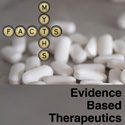Episode 46: High quality information on drug safety – Special Guest Dr. Bruce Psaty
In episode 46 we speak with one of the gurus of drug safety, Dr. Bruce Psaty, to get some insight on the whole issue of identifying the good and bad things that drugs can do. We come to the conclusion that high quality information is ultimately what is needed if we are to understand what drugs can and cannot do. Both Mike and James lament on their ability to produce high quality information.



